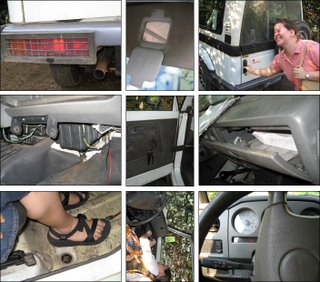Alternative alternative title: I hope I don’t get in trouble at work over this
I’ve been complaining about the car I’ve been driving for a while now. In theory, we’re meant to switch cars every week so that people don’t get stuck with the good cars all the time, but I have been driving the Suzuki Samurai (no joke, that’s its name) for the better part of two months.
This is, by far, the shittiest car in the office. I must have pissed off the guy who works on the car rotation and, despite my brown-nosing, he doesn’t seem too sympathetic to my whining. He wants my death. As I do his.
To prove my case, I have decided to perform what highly trained car mechanics call “the 9-point check”. Lovely L. has been my invaluable assistant in this technical quest.
(From left to right)
Top row
Point 1-the lights
As you can see, the lights on the car are well protected from street thugs and petty thieves. Which is somewhat laughable as no one ever EVER tries to rob this appealing car. The lights also fail to shine properly at night causing me to drive with a flash light in hand to light the road.
Point 2- the mirror
A car mirror is always a good thing to have for a girl. She can comb her hair, check her make-up or make alluring smiles at herself. In Congo, she can also check how much she has sweat in the a/c-less vehicle. Please note the band of semi-clean plastic around the mirror, flanked by grimy, dusty plastic.
Point 3-the trunk
Lovely L. is demonstrating how difficult it is to open the backdoor. The best way of placing items in the trunk is the sit in the front seat and fling your items backwards. Steer clear of possible passengers in the backseat…if they dare ride with you.
Middle Row
Point 4-bunch of wires
I believe there once was a radio between the two front seats. This is just a rumor though and all that is left are a few naked wires dangling in the leg area. These are great for hot wiring the car.
Point 5-the window handle
The window handle on the driver’s side has broken. This has been fixed by soldering a stiff piece of metal and careful wrapping it with duct tape. The tape has unraveled, leaving one’s hands sore and sticky. It’s part of its charm.
Point 6-the glove box
This is were one should keep the numerous papers needed for the not-infrequent arrests by traffic cops. It does not close. The current location of important papers is still under intense debate.
Bottom Row
Point 7-The foot rest
If it were rusted, my passenger would have to hug her legs to her chest in order not to fall through. Fortunately, the hole is still small. I give it two weeks.
Point 8-the handle bar
As this is a sturdy car made for rough road trips, it has a handle bar which enables the passenger to hold tight. Unfortunately, as I am demonstrating here, the handle bar has completely broken off.
Point 9-the exclamation point light
I have no idea what the exclamation point means but obviously, it can’t be a good thing. It’s on ALL the time. Is it trying to tell me something?
Verdict-Uncomfortable, undriveable, and unsafe.
Do not assign this car to staff. Only assign this car to your worse enemy.
